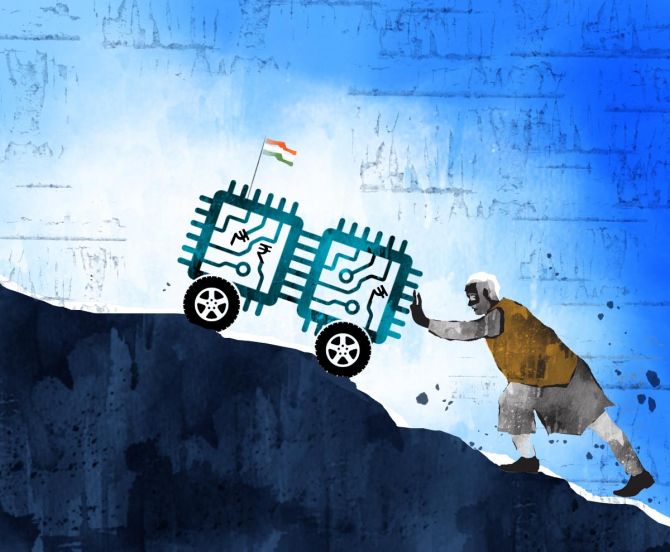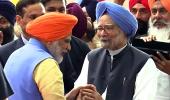Two full-fledged semiconductor fabrication plants are going to come up in India very soon entailing multi-billion dollar investment besides several chip assembly and packaging units, Minister of Electronics and IT Rajeev Chandrasekhar said.

In an interview with PTI, the minister confirmed that the two projects include a $8 billion proposal submitted by Israel-based Tower Semiconductors and the other from Tata Group.
"I am happy to share this with you and you are probably the first one I'm sharing this with.
"In the near term, two full-blown fabs are going to come up in India.
"These are going to be multi-billion-dollar fabs in the 65, 40 and 28-nanometer technology and there are going to be a host of other packaging proposals that we are evaluating," Chandrasekhar said.
He was responding to a question on $8 billion investment proposal submitted by Tower Semiconductors and the status of India's semiconductor roadmap.
The minister said that the project will be approved in the third term of Prime Minister Narendra Modi if they are not cleared before the upcoming general elections.
"I can safely tell you that the names that you mentioned have submitted these big, very credible, very significant investment proposals.
"There are other announced proposals by Tata as well in the fab.
"We see this happening in a very, very quick short term," Chandrasekhar said.
The government has received four proposals for setting up semiconductor manufacturing plants and 13 for chip assembly, testing, monitoring and packaging (ATMP) units.
The proposals are in addition to a Rs 22,516-crore chip assembly plant being set up by US-based memory chip maker Micron in Gujarat.
The minister said India's semiconductor story is very akin to that of electronics in the country.
He said that the government before 2014, the UPA government, ignored electronics and for 75 years, India was a "classic case of missed opportunity" in semiconductors.
"In 2012 Intel wanted to set up a plant here, and they found no support and they walked away. When the prime minister launched this (semiconductor) program in 2020 January, we knew we had to work very fast, and smartly and we had to in essence play catch up for the last 75 years of lost opportunity.
“We have made significant progress in a broad spectrum of areas: semiconductor design, startups, research, talent, packaging and fabrication," Chandrasekhar said.
According to government data, domestic electronics manufacturing increased over four-fold to Rs 8.22 lakh crore in the last 10 years.
In FY 2013-14, electronics manufacturing was Rs 1,80,454 crore ($29.8 billion) and has grown significantly to Rs 8,22,350 crore ($102 billion) in FY 2022-23, which is further expected to grow up to Rs 23,95,195 crore ($300 billion) by 2026.
Chandrasekhar also wrote a letter to Finance Minister Nirmala Sitharaman before the budget to reduce import duty on electronic components to facilitate the growth of exports from the country.
The minister said he learnt from his former boss and ex-CEO of Intel Andrew Grove's book, "Only the Paranoid Survive...".
"I believe in being paranoid. I believe that as a nation, we should never take our leadership for granted.
"The letter that I wrote to the finance minister, unfortunately, we mischaracterized like some.
"In reality, it was a letter that effectively pointed out the big opportunity India had to move from import substitution-led manufacturing, to export-led manufacturing," Chandrasekhar said.
He said the global value chain supply of electronics is shifting from being predominantly based in China to now looking for more hubs.
"India has played a big role in that shift in the last five years. India will play a big role in the coming five years to a decade.
"Electronics manufacturing, we were almost absent.
"To put it in the words of Tim Cook (Apple CEO).
"Three years ago there were no Apple phones being manufactured in India.
"We were importing 100 per cent of all mobile phones.
"Today we are exporting $10-12 billion of Apple and Samsung mobile phones," the minister said.
He said that the growth has been spectacular.
"Our prime minister's ambition is to get to the top of the peak.
"So whatever I say pre-budget, whatever our views of the budget, are aimed at taking our success and taking it further.
"We believe and our prime minister has a clear vision that we want to do $300 billion of electronics manufacturing by the year 2026-27," the minister said.
India has now reached a stage where 99.2 per cent of mobile handsets being used in the country are manufactured domestically, and from being an importer in the segment, the country has now become an exporter, as per official data.
"We have an absolutely clear view in the government and the prime minister, that smartphones IT, laptops, servers or hardware is an area that we want to be global champions and leaders and play the role of being a very trusted partner to the GVCs for enterprises, governments and people of the world," Chandrasekhar said.











 © 2025
© 2025